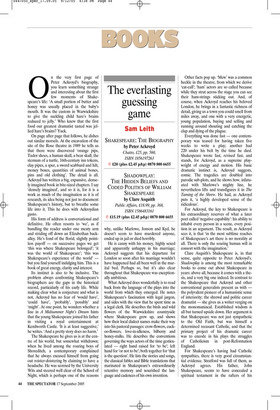O n the very first page of Peter Ackroyd’s biography, you
learn something strange and interesting about the first few moments of Shakespeare’s life: ‘A small portion of butter and honey was usually placed in the baby’s mouth. It was the custom in Warwickshire to give the suckling child hare’s brains reduced to jelly.’ Who knew that the first food our greatest dramatist tasted was jellied hare’s brains? Yuck.
On page after page that follows, he dishes out similar morsels. At the excavation of the site of the Rose theatre in 1989 he tells us that there were discovered ‘orange pips, Tudor shoes, a human skull, a bear skull, the sternum of a turtle, 16th-century inn tokens, clay pipes, a spur, a sword scabbard and hilt, money boxes, quantities of animal bones, pins and old clothing’. The detail is all. Ackroyd has written a big, expansive, densely imagined book in bite-sized chapters. I say ‘densely imagined’, and so it is, for it is a work as much of the imagination as it is of research, its idea being not just to document Shakespeare’s history, but to breathe some life into it. This he does with Ackroydian gusto.
His form of address is conversational and definitive. He often resorts to ‘we’, as if bundling the reader under one meaty arm and striding off down an Elizabethan backalley. He’s fond of the florid, slightly pointless payoff — on successive pages we get ‘this was where Shakespeare belonged’; ‘it was the world of Shakespeare’; ‘this was Shakespeare’s experience of the world’ but you find yourself indulging him. This is a book of great energy, clarity and interest.
Its instinct is also to be inclusive. The problem always confronting Shakespeare’s biographers are the gaps in the historical record, particularly of his early life. While making clear what is conjecture and what is not, Ackroyd has no fear of ‘would have’, ‘could have’, ‘probably’, ‘possibly’ and ‘might’. At one point, he wonders whether a line in A Midsummer Night’s Dream hints that the young Shakespeare joined his father in visiting a royal entertainment at Kenilworth Castle. ‘It is at least suggestive,’ he writes. ‘And a pretty story does no harm.’ The Shakespeare he gives us is at the centre of his world, but somewhat withdrawn; when he lived among the roaring boys of Shoreditch, a contemporary complained that he always excused himself from going out roister-doistering by claiming to have a headache. He was scorned by the University Wits and steered well clear of the School of Night, which is perhaps one of the reasons



















































 Previous page
Previous page